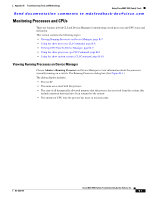Cisco MDS-9124 Troubleshooting Guide - Page 521
Using FC Ping, Using FC Traceroute, Tools > Ping, Tools > Traceroute, fctrace
 |
View all Cisco MDS-9124 manuals
Add to My Manuals
Save this manual to your list of manuals |
Page 521 highlights
Appendix B Troubleshooting Tools and Methodology Using Cisco MDS 9000 Family Tools Send documentation comments to [email protected] These tools have been migrated to Fibre Channel for use with the Cisco MDS 9000 Family switches and are called FC ping and FC traceroute. You can access FC ping and FC traceroute from the CLI or from Fabric Manager. This section contains the following topics: • Using FC Ping, page B-5 • Using FC Traceroute, page B-5 Using FC Ping The FC ping tool: • Checks end-to-end connectivity. • Uses an pWWN or FCID. FC ping allows you to ping a Fibre Channel N port or end device. (See Example B-1.) By specifying the FCID or Fibre Channel address, you can send a series of frames to a target N port. Once these frames reach the target device's N port, they are looped back to the source and a time-stamp is taken. FC ping helps you to verify the connectivity to an end N port. FC ping uses the PRLI Extended Link Service, and verifies the presence of a Fibre Channel entity in case of positive or negative answers. The FC Ping feature verifies reachability of a node by checking its end-to-end connectivity. • Choose Tools > Ping to access FC ping using Fabric Manager. • Invoke the FC ping feature using the CLI by providing the FC ID or the destination port WWN information in the following ways: switch# fcping pwwn 20:00:00:2e:c4:91:d4:54 switch# fcping fcid 0x123abc Example B-1 FC Ping Command switch# fcping fcid 0xef02c9 vsan 1 28 bytes from 0xef02c9 time = 1408 usec 28 bytes from 0xef02c9 time = 379 usec 28 bytes from 0xef02c9 time = 347 usec 28 bytes from 0xef02c9 time = 361 usec 28 bytes from 0xef02c9 time = 363 usec 5 frames sent, 5 frames received, 0 timeouts Round-trip min/avg/max = 347/571/1408 usec Using FC Traceroute Use the FC Trace feature to: • Trace the route followed by data traffic. • Compute inter-switch (hop-to-hop) latency. FC traceroute identifies the path taken on a hop-by-hop basis and includes a timestamp at each hop in both directions. (See Example B-2.) FC ping and FC traceroute are useful tools to check for network connectivity problems or verify the path taken toward a specific destination. You can use FC traceroute to test the connectivity of TE ports along the path between the generating switch and the switch closest to the destination. Choose Tools > Traceroute on Fabric Manager or use the fctrace CLI command to access this feature. OL-9285-05 Cisco MDS 9000 Family Troubleshooting Guide, Release 3.x B-5















